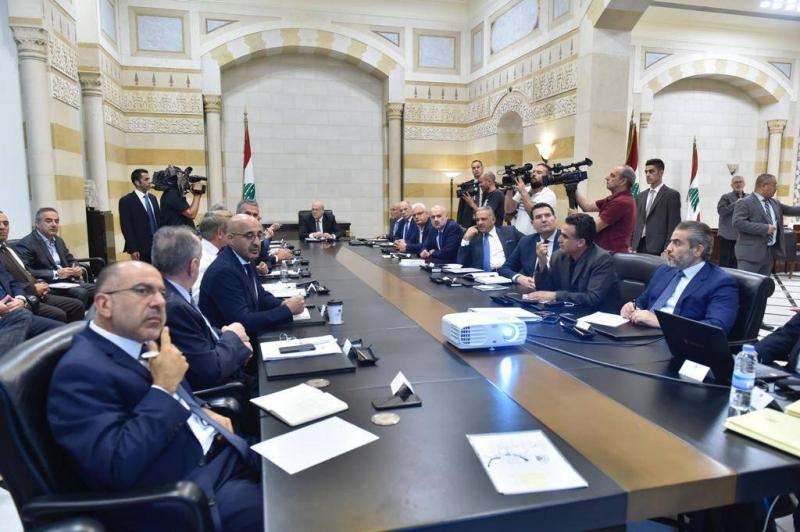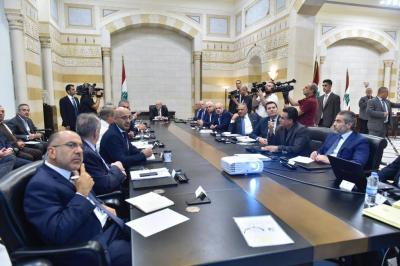The ministerial committee dedicated to the electricity sector has decided, regarding the coverage of credits in dollars, to present the entire issue at the first session of the Cabinet to discuss the matter at hand, particularly the results of Minister of Energy Walid Fayyad failing to obtain the committee's clear and explicit approval. This discussion will also explore, should an unintentional error occur with the relevant parties, particularly the Ministry of Finance and the Central Bank of Lebanon, the possibility of providing coverage in US dollars for the credits that need to be opened.
The decision was issued following discussions and deliberations, in light of the clear and explicit prior approval that the Minister of Energy did not secure for the purchase of gas and fuel oil. This follows a decision taken in a committee meeting on April 12, and after the minister clarified that this matter is considered by him an unintentional mistake. The committee aimed to verify first the proper implementation of the electricity plan and secondly to ensure the availability of the required credits. The committee indeed confirmed the progress stages of the electricity plan as presented by the General Director of the Electricite du Liban (EDL), commending the work of the Chairman, board members, and employees of the institution.
The committee confirmed that "Walid Fayyad still has, as decided in the previous committee session, the freedom to act with the ship as he sees fit to avoid any harm for which the state is not liable."
In this context, the caretaker Minister of Energy and Water, Walid Fayyad, mentioned after the meeting that "the General Director of the electricity presented the reality of the plan's development, including the fuel stock, collections, performance, and existing balance in the electricity account at the Central Bank of Lebanon. There was unanimous acknowledgment of the positive progress in the emergency plan's implementation, which is a positive matter."
He clarified that "there is a new issue concerning the fuel requested by EDL in the spring, which has been carried out, and we held a transparent open tender based on the committee's directives. The bid was awarded after the first offer was rejected due to high prices, and we conducted a second tender according to public procurement law, reaching a better offer awarded to a company based on a price of $95, with payment deferred for six months."
Fayyad added, "After we informed the committee of the tender result, which is a temporary award, the committee did not convene to provide a direct and explicit approval for the tender result. At the same time, we wanted to facilitate the institution's work, and the confusion that occurred was that we informed the committee but did not insist on convening it; the committee's chairman should have insisted on the meeting, and we should have strived more to obtain the committee's approval. However, the emergency plan is indeed proceeding correctly, and all committee members praised it."
He noted that "today's event was the General Director presenting the inventory issue, which was indicated to be sufficient for this month and the next, averaging 4 to 5 hours, but in October, should the ship not arrive, there is a possibility of reducing supply hours, as the absence of this quantity puts the inventory at risk."
He revealed that "the Electricite du Liban pointed out in the meeting that it had only spent $200 million of the treasury advance, with about $100 million remaining, and the shipment could be financed with part of the $100 million. The response was that the central bank does not want to finance from depositors' funds, which is what we also want. We believed that the $300 million advance was secured but did not know its source due to a lack of transparency in the Ministry of Finance and the Central Bank of Lebanon."
He continued, "We have the option at the same time to open a letter of credit, as the Minister of Finance approved it, stipulating that payment will be made after six months." He pointed out that "Electricite du Liban, according to what was presented, has the potential to pay from its balance, which amounts to about $43 million but in Lebanese pounds, based on a hundred thousand Lebanese pounds for the price of the dollar. Therefore, the conversion from pounds to dollars is beneficial for the central bank should it decide so. We need to convert this money, and we did not approach money changers for conversion because we rely on the central bank to do that. However, the new issue lies in the transition of governance from Riad Salameh to Dr. Waseem Mansouri, which is still ongoing, and we are still more or less where we are. What the committee requested today is to regroup with the Minister of Finance and the Governor of the Central Bank, in the presence of the Prime Minister, to know whether the bank can, within a specific timeframe, open the letter of credit that the Minister of Finance approved."




